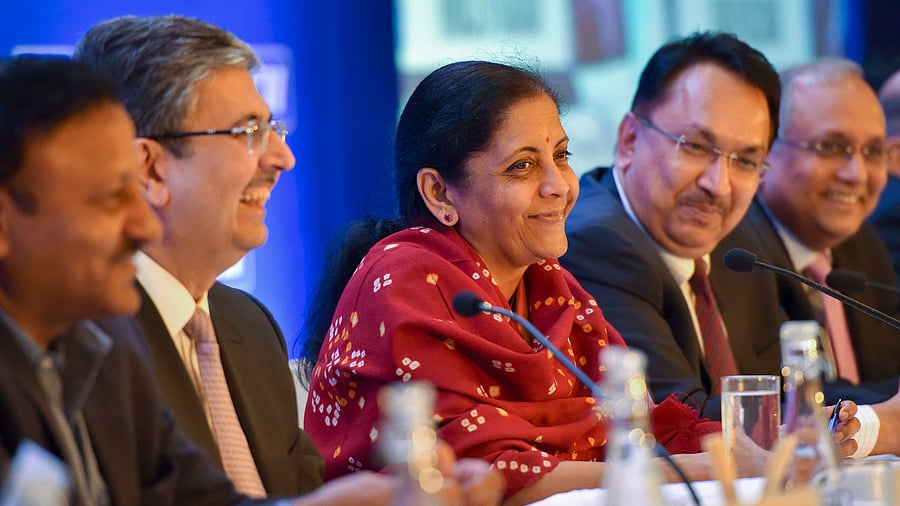
FM with a few industry leaders.
Credit: File Photo
New Delhi: The central government should reduce excise duty, which accounts for nearly 20% of the retail price of petrol and diesel in the country, in order to curb inflation and boost household consumption, industry body Confederation of Indian Industries (CII) has said in its recommendations ahead of the Union Budget 2025-26.
“Reducing excise duty on fuel is crucial as fuel prices significantly drive inflation, forming a substantial portion of the overall household consumption basket,” the Confederation of Indian Industry (CII) said in a statement.
The central excise duty alone accounts for nearly 21% of the retail price for petrol and 18% for diesel. Retail prices of petrol and diesel have remained almost unchanged since May 2022 despite around 40% decline in crude oil price in the global markets.
“Lowering excise duty on fuel would help reduce overall inflation and increase disposable incomes,” CII said.
Finance Minister Nirmala Sitharaman is scheduled to hold a pre-budget consultation meeting with the industry representatives on Monday. The Union Budget 2025-26 is likely to be presented on February 1.
The industry body, in its statement, also pitched for higher allocation for social welfare schemes like MGNREGA, PM-KISAN and Pradhan Mantri Awas Yojana (PMAY).
CII has suggested that the daily minimum wage under the MGNREGA should be hiked from Rs 267 to Rs 375 in line with the recommendations of the ‘Expert Committee on Fixing National Minimum Wage’ submitted in 2017. This would entail an additional expenditure of Rs 42,000 crore. It also recommended hiking the annual payout under the PM-KISAN scheme from Rs 6,000 to Rs 8,000. Assuming 10 crore beneficiaries, this would entail an additional expenditure of Rs 20,000 crore.
“Domestic consumption has been critical to India’s growth story, but inflationary pressures have somewhat eroded the purchasing power of consumers. Government interventions could focus on enhancing disposable incomes and stimulating spending to sustain economic momentum,” said Chandrajit Banerjee, Director General, CII.
Acceleration of economic growth is likely to be one of the key focuses of the upcoming budget. India’s gross domestic product (GDP) growth slipped to a seven-quarter low of 5.4% in July-September period, as per the latest official data.
Meanwhile, in order to improve ease of doing business, the Engineering Export Promotion Council of India (EEPC India) has suggested making goods and services tax (GST) audit faceless in line with income tax processes.
“The faceless GST audit system, by using technology and ensuring anonymity, will reduce compliance costs. A faceless system will streamline procedures allowing MSMEs to focus on growth and innovation,” said Pankaj Chadha, Chairman, EEPC India.
In its pre-budget recommendation EEPC India has also proposed that reverse charge mechanism (RCM) related liabilities should be eligible for the Amnesty scheme.
Under the GST framework, reverse charge means the liability to pay tax is on the recipient of supply of goods or services instead of the supplier of such goods or services in respect of notified categories of supply.